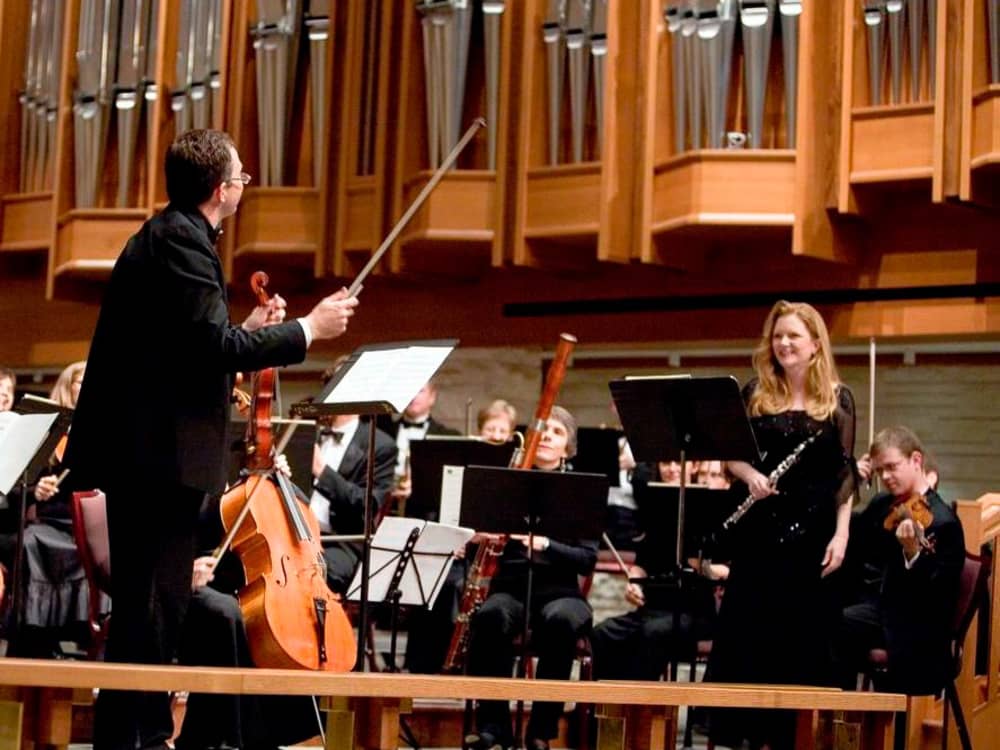 Alecia Lawyer with the River Oaks Chamber OrchestraDavid Brown
Alecia Lawyer with the River Oaks Chamber OrchestraDavid Brown Alecia Lawyer, principal oboist for the River Oaks Chamber Orchestra
Alecia Lawyer, principal oboist for the River Oaks Chamber Orchestra
Last summer, sitting between my friends Jeff and Melissa watching James Levine rehearse the Boston Symphony Orchestra at Tanglewood, I marveled at the level of intelligent banter between the two.
Why can't I say smart things about classical music?
Why, after all these years, do I still sound like a TV reality show judge and just say, “It's awesome?”
I may have commented on Levine's choice of golf shirt, but that hardly qualifies.
Part of getting over a problem is admitting I have one. Here goes: I am a classical music newbie.
And, what's worse, I have no excuse.
I was raised in a music-filled household, with opera and classical music blaring at such levels we were on a first name basis with the police. Sometimes my father would invite them in to listen.
The various conductors of the Buffalo Philharmonic Orchestra, Lucas Foss, Michael Tilson Thomas, Julius Rudel and JoAnn Falletta, were heralded with the same respect as Buffalo Bills quarterbacks.
And then there was the matter of piano lessons and the steady stream of teachers who quit what would have been a good three-kid-in-a-row gig. Some never came back, others had to leave town suddenly. One just flat out told my mother her offspring were hopeless, and he feared for his own musical abilities by teaching us.
That hurt.
During college, I had BSO (Boston Symphony Orchestra) obstructed-view season's tickets and followed Seiji Ozawa's moves, well at least half of him. During my dancing and choreographing years I bypassed classical music for bland ambient music. Sorry about that.
In Houston, I sidestepped the whole issue by hiding out at dance and theater events. Don't suggest the dumbed-down pops approach. No amount of film music, Beatles plus strings or video game tunes are going to help me use the term “fifths” in a sentence.
I was ready to accept eternal newbie status when I came upon Alecia Lawyer, founder of the River Oaks Chamber Orchestra (ROCO). Lawyer is a flame-haired dynamo who makes classical music seem like the most fun thing on the planet. She possesses an odd combo of beauty pageant good looks, unbridled enthusiasm, and snazzy set of chops on the oboe.
If she can't get you fired up about music, nobody can.
Just about everything ROCO does is user-friendly, from helping people pronounce the names of the composers, charting the orchestra, to having the conductor introduce each piece.
Finally, I found an entire orchestra to hold my hand. Essays in the program give context, but if you are in hurry, there's a list of handy take-home points at the bottom.
I headed over to St. John the Divine to hear my first ROCO event. After Behzad Ranjbaran's riveting piece, the musicians slapped on name tags and wandered through the audience. No way was I going to miss this quality schmoozing opportunity.
“The piece sounded so fresh. Was it hard to play?” I asked one willing violinist.
Turns out Ranjbaran's "Awakening for String Orchestra" was hot out of the rehearsal studio and an edge-of- your-seat difficult piece.
Eureka! A moderately successful musical exchange. Nothing profound, but a start nonetheless.
In order to truly face my fears, Lawyer suggested I place myself smack in the middle of the orchestra.
In a quasi-George Plimpton move (he would have played the violin), I sat on stage, tucked in between the horns and the violins, staring straight into the intense eyes of conductor Joel Smirnoff for Haydn's Symphony No. 96, “Miracle.”
It's intoxicating to watch musicians of this caliber make music together.
Later in the week, I hung out with the ROCO gang again at The Tasting Room with cellist Richard Belcher.
So there you have it, a girl doesn't have to choose between her new love (music) and her old love (wine).